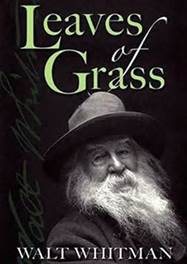The Poetry of Walt Whitman
“This is what you shall do;
Love the earth
and sun
and
the animals,
despise riches,
give alms to everyone that asks,
stand up for the stupid and crazy,
devote your income and labor to others,
hate tyrants,
argue not concerning God,
have patience and indulgence toward the people,
take off your hat to nothing known or unknown or to any man or number of men,
go freely with powerful uneducated persons
and with the young
and with the mothers of families,
read these leaves in the open air
evert season of every year of your life,
re-examine all you have been told
at school or church or in any book,
dismiss whatever insults your own soul,
and your very flesh shall be a great poem
and have the richest fluency not only in its words
but in the silent lines of its lips and face
and between the lashes of your eyes
and in every motion and joint of your body.”
WALT WHITMAN was born in Westhills, Long Island, May 31, 1819, in a farm-house overlooking the sea. While yet a child his parents moved to Brooklyn, where he acquired his education. He learned type-setting at thirteen years of age. Two years later he taught a country school. He contributed to the “Democratic Review” before he was twenty-one years old. At thirty he traveled through the Western States, and spent one year in New Orleans editing a newspaper. Returning home he took up his father’s occupation of carpenter and builder, which he followed for a while. During the War of the Rebellion he spent most of his time in the hospitals and camps, in the relief of the sick and disabled soldiers. For a time he was a department clerk in Washington.
In 1856 he published a volume entitled “Leaves of Grass.” This volume shows unquestionable power, and great originality. His labors among the sick and wounded necessarily made great impressions; these took form in his mind and were published under the title of “Drum Taps.”
His poems lack much of the standard of recognized poetic measure. He has a style peculiar to himself, and his writings are full of meaning, beauty and interest. Of his productions, Underwood says: “Pupils who are accustomed to associate the idea of poetry with regular classic measure in rhyme, or in ten-syllabled blank verse or elastic hexameters, will commence these short and simple prose sentences with surprise, and will wonder how any number of them can form a poem. But let them read aloud with a mind in sympathy with the picture as it is displayed, and they will find by nature’s unmistakable responses, that the author was a poet, and possessed the poet’s incommunicable power to touch the heart.” He died in Camden, N. J., March 20, 1892.
Charles Clanton Rogers March 5, 2016
Biography from: http://www.2020site.org/poetry/index.html





Thanks for introduction to Whitman. He lead a very simple, eclectic life. I also enjoyed the music. What were the selections. I haven’t finished yesterday’s read. I still working on the speech. It made me think. Thanks for the enlightenment!!! Here’s wishing you an awesome weekend.
LikeLiked by 1 person
What a powerful and rich live Walt Whitman led.
A life much like your own Doctor Charles.
LikeLiked by 1 person
Thank you; I admire Whitman
LikeLiked by 1 person
A true national treasure.
LikeLiked by 1 person